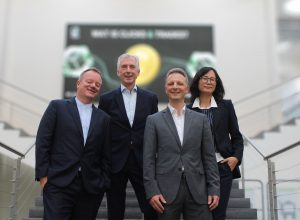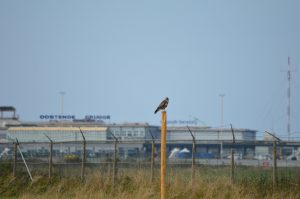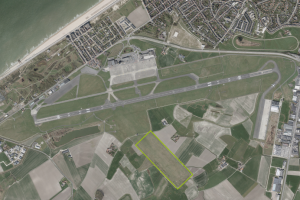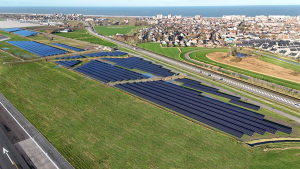| Date | Flight | Scheduled | Destination | Terminal | Status |
|---|---|---|---|---|---|
| 28/02/2026 | TB1171 | 06:00 | Alicante | ||
| 28/02/2026 | TB1621 | 13:10 | Gran Canaria |
| Date | Flight | Scheduled | Origin | Terminal | Status |
|---|---|---|---|---|---|
| TB1172 | 11:45 | Alicante |
| Date | Flight | Scheduled | Destination | Terminal | Status |
|---|---|---|---|---|---|
| 28/02/2026 | TB1171 | 06:00 | Alicante | ||
| 28/02/2026 | TB1621 | 13:10 | Gran Canaria |
| Date | Flight | Scheduled | Origin | Terminal | Status |
|---|---|---|---|---|---|
| TB1172 | 11:45 | Alicante |
3/9/2025 | Ostend-Bruges Airport and TUI fly today celebrated the inaugural winter flight to Hurghada. Until now, the popular Egyptian resort was only accessible from Ostend between April and October, but from now on, travellers can fly directly to the Red Sea all year round.
Starting this winter season, TUI fly will operate a weekly direct flight every Monday from November through March. During the summer season – from April until the end of October – the Saturday flight will remain. This new winter connection represents a 22% capacity increase during the winter months, thanks in part to additional flights to Alicante and Málaga. With this, Ostend-Bruges Airport and TUI strengthen their partnership and further expand their range of year-round destinations – a clear evolution toward offering routes that are no longer purely seasonal.
“With temperatures staying above 20 degrees throughout the year, Hurghada is the ideal destination for those who want to enjoy sun, sea, and relaxation even in winter,” said Nathan De Valck, CEO of Ostend-Bruges Airport. “We are very pleased that, alongside popular Spanish destinations such as Málaga, Alicante, Tenerife, and Gran Canaria, we can now also offer Egypt during the winter season.”
TUI also highlights the importance of this expansion: “Egypt has long been one of the rising stars in TUI’s holiday portfolio, mainly thanks to its excellent hotels offering great value for money,” said Gunther Hofman, Managing Director TUI fly Belgium & the Netherlands. “We’re delighted that our loyal travellers from West and East Flanders can now also depart to Hurghada in winter from their beloved Ostend Airport.”
More and more travellers are consciously choosing the comfort and efficiency of a regional airport. Departing close to home, smooth check-in procedures, and short walking distances make the holiday begin right at the airport.
Flights can be booked via www.tuifly.be, www.tui.be, or through a licensed travel agent.

09/10/2025 | Ostend-Bruges Airport is pleased to announce the appointment of Johan Leunen as Cargo Development Director, reinforcing the airport’s commitment to strengthening its cargo activities and sustainable growth.
Johan brings more than 23 years of experience in the air cargo industry. He began his career in 2000, building expertise across cargo handling, forwarding, and airport development. Starting in operations, he advanced through roles in customer support and sales management, gaining a comprehensive understanding of the industry.
Beyond his early career at Brussels Airport, Johan also worked as Business and Market Development Manager in the forwarding sector. In 2012, he joined Brussels Airport Company as Cargo Marketing Manager, where he focused on supporting cargo airlines and fostering their growth. Until January 1st, 2025, Johan served as Senior Business & Development Manager Cargo at Brussels Airport, playing a pivotal role in attracting new cargo airlines and logistics players, and contributing significantly to the airport’s international outreach and development.
In his new role at Ostend-Bruges Airport, Johan will work alongside the Cargo Sales Director Rose Yiqian QIU and Egis Group Director of Cargo Strategy Steven Verhasselt to further develop the airport’s cargo services, attract new business opportunities, and drive sustainable growth in line with the region’s strategic ambitions.
Nathan De Valck, CEO of Ostend-Bruges Airport, commented:
“We strongly believe in the opportunities that the air cargo sector holds for Ostend-Bruges Airport. Johan’s expertise, industry knowledge, and extensive network will be a great asset to our team. With his support, we are confident we can strengthen our position as a key cargo gateway and contribute to the economic development of the region.”

LeShuttle Freight and Ostend-Bruges Airport have entered into a strategic partnership to establish a high-speed, multimodal logistics corridor between mainland Europe and the United Kingdom. The collaboration aims to provide faster, more flexible, and more sustainable cargo solutions—particularly for time-critical shipments such as perishables, pharmaceuticals, and e-commerce goods.
Strategically located just 95 km from the LeShuttle Freight terminal in Coquelles, Ostend-Bruges Airport enables cargo to reach the UK in approximately 2 hours and 30 minutes after arrival under optimal conditions. By combining each other’s strengths and expertise, this partnership establishes a seamless logistics corridor for time-sensitive goods.
Its proximity, combined with 24/7 operations and the absence of slot restrictions, positions Ostend-Bruges Airport as one of the most efficient cross-Channel gateways for urgent freight, offering unmatched speed and access. This partnership also builds on the airport’s long-standing role as a logistics bridge between continental Europe and the UK, offering seamless air-to-road transitions and ensuring smooth handling with minimal delays.
“This strategic partnership streamlines rapid cargo transfers to the United Kingdom and offers a perfect solution for time-sensitive shipments,” says Nathan De Valck, CEO of Ostend-Bruges Airport. “With 24/7 operations, direct connectivity to the Channel Tunnel, and no slot restrictions at both the airport and the Eurotunnel terminal, we are setting a new benchmark for urgent freight transport while providing our customers with maximum flexibility and reliability.”
Peter Roberts, Freight Commercial Strategy Director at LeShuttle Freight, adds: “Speed, efficiency, and customer care are at the core of our services. Partnering with Ostend-Bruges Airport allows us to move cargo seamlessly to and from the UK, while optimizing the flow between road and air transport. Together, we are creating a logistics corridor that is both agile and resilient.”
Both partners are also committed to reducing their carbon footprint through smart logistics planning and a shared focus on sustainability and innovation.

Ostend, 3 September 2025 – In early August, EASP AIR BV and Ostend-Bruges Airport signed a Letter of Intent for the development of a state-of-the-art hangar and office complex. The project includes two spacious hangars, each equipped with a three-story office tower. The new facility will be centrally located on Apron 2, replacing the existing outdated structures. The total surface area of the new site will amount to over 4,900 square meters.
“With this project, we are taking a significant step towards the renewal and modernization of our airport,” said Nathan De Valck, CEO of Ostend-Bruges Airport. “We aim to achieve sustainable growth by investing in multiple strategic pillars.”
For EASP AIR, the development marks a major milestone. “Our choice for Ostend is a deliberate one,” explained Pieter Voeten, CEO of EASP AIR. “We recognize the strong ambitions of Ostend-Bruges Airport, which align perfectly with our own growth strategy. Its strategic location and infrastructure make it the ideal base for our Special Mission Expertise Center.”
Special Mission Expertise Center
The planned center will focus on specialized aviation operations with societal relevance, including coast guard missions, aerial firefighting, and disaster response support. Thanks to its strategic location and excellent facilities, Ostend-Bruges Airport offers an ideal base for such operations in the North Sea and wider region. From this location, EASP AIR will continue to efficiently and professionally support its key end-users – including the European Border and Coast Guard Agency (FRONTEX).
Strategic Partnership
The arrival of EASP AIR strengthens the airport’s position. “By investing not only in passenger and cargo flights but also in MRO activities (Maintenance, Repair & Overhaul), we are creating additional employment opportunities in West Flanders and enhancing the innovative and specialized character of our airport,” De Valck added. “Moreover, synergies are emerging with other airport partners, such as VIVES, in the context of technical training programs.”
EASP AIR also sees significant growth potential: “Thanks to the strategic location near the coast and national borders, and the existing facilities in Ostend, we can fully support our operations across Europe and the UK in terms of maintenance, logistics, and training,” said Pieter Voeten. “The presence of strong educational institutions in the region also creates opportunities for all stakeholders involved.”
Maintenance and Logistics Facilities
The new hangars and office spaces will serve as the operational base for EASP AIR’s fleet of DO328 Maritime Patrol Aircraft, offering secure parking and comprehensive maintenance capabilities. Additionally, the facilities will support maintenance activities in collaboration with EASP AIR’s partner, JetSupport. JetSupport’s maintenance support will primarily focus on business jets and regional military training aircraft, such as the Pilatus PC-7 and PC-21.
The hangars are designed with ample capacity to accommodate larger aircraft, including the Bombardier Global 7500, during scheduled maintenance operations. Furthermore, the site will feature bonded warehousing, secure storage areas, and a dedicated shipments department to support logistical operations.
Office space will be shared by EASP AIR NL/UK, JetSupport, and existing tenants already active at Ostend-Bruges Airport, fostering synergy and operational efficiency within the airport’s aviation cluster.
June 26, 2025 – Ostend-Bruges Airport has been awarded the 2025 TIACA Corporate Sustainability Award. The award honors forward-thinking sustainability initiatives in the air cargo industry. The airport was selected for its innovative biodiversity program, biOSTdiversity, which uniquely combines nature conservation with aviation safety. “This award reflects not only the success of biOSTdiversity, but also our broader, long-term commitment to sustainability,” says CEO Nathan De Valck. “We’re proving that sustainability is not the exclusive domain of major international hubs. Regional airports can lead the way and show that meaningful impact can start at any scale.”
BiOSTdiversity
Developed by the airport’s in-house team, the biOSTdiversity program repurposes a disused 22-hectare old grass runway into a vibrant biodiversity zone. Located at a safe distance from flight operations, this area is being restored as a secure habitat for native bird species, birds of prey, and small mammals.
Fifty elevated poles have been installed to serve as resting and hunting perches for raptors like kestrels and buzzards. The project also actively supports the relocation and conservation of endangered species, including the black-tailed godwit, curlew, oystercatcher, and great crested newt.
Closer to the active runway, the airport implements a ‘short grass policy’ and uses animal-friendly deterrents and methods such as scare noises to discourage bird activity in critical areas—gently guiding wildlife toward safer zones. “Since the launch of biOSTdiversity, there has been a significant reduction in birdstrikes. This is an encouraging development”, De Valck notes. “This proves that safety and sustainability can go hand in hand.”


Broader sustainability strategy
biOSTdiversity is one part of a wider, integrated sustainability strategy at Ostend-Bruges Airport. “Sustainability is not the exclusive domain of major hubs. Through bold choices, local engagement, and strategic partnerships, we’re showing what a regional airport can achieve,” De Valck adds. “We hope this work inspires others, because meaningful impact can begin at any scale.”
Second largest solar park in Belgium
A cornerstone of the airport’s decarbonization efforts is a massive new solar park, developed in partnership with EnergyVision. Once complete, it will be the largest in West Flanders and the second largest in Belgium. By 2026, it is expected to generate more than 37,000 MWh of green electricity annually. The first 10,000 MWh are already live and connected to the grid.
This production enables the airport to rely on local renewable energy to meet its operational needs, significantly reducing its carbon footprint and strengthening its energy independence. Through the citizen platform ‘Stroom van ’t zeetje’ (Electricity of the Sea), surplus electricity is made available to up to 10,000 local households at a fixed rate, with opportunities for direct community investment—creating both environmental and social value.
The solar energy will also directly support the ongoing electrification of airport operations. The airport and its partners are actively transitioning their vehicle fleets to electric power. The first electric vehicles and airside charging stations are already in place, with approximately 35% of the fleet electrified by the end of this year.


Infrastructure renewal
Recent upgrades highlight Ostend-Bruges Airport’s commitment to resource efficiency. In 2024, the airport’s single 3,200-meter runway was fully renovated, with 50% of the existing pavement material reused. All runway lighting was replaced with energy-efficient LED systems. Even before 2024, all three aprons and the passenger terminal were already equipped with LED lighting.
In line with parent company EGIS Group’s sustainability goals, a new heating system was installed—cutting annual gas use by 20%, saving 128 tons of CO₂, and halving electricity consumption for HVAC systems.
Path to net zero
As part of the Airport Carbon Accreditation program (ACI Europe), Ostend-Bruges is currently certified at Level 2, with Level 3 accreditation expected later this year. The airport follows the EGIS climate roadmap, targeting a 30% CO₂ reduction by 2030, and net zero by 2050 or earlier.
Meanwhile, the airport collaborates closely with airline partners to promote more sustainable flight operations. Carriers like TUI fly are transitioning to next-generation aircraft, such as the Boeing 737 MAX, which are both quieter and more fuel-efficient. Next to that, our logistics real estate partner, Versluys Logistics, also commits to use sustainable materials in the construction of the new cargo warehouses and focuses on the sustainability of its buildings.